[For an explanation of this series, see the post The (Book) Lives of the (Not So) Rich and (Marginally) Famous. I will be asking the same questions of all I interview, with a few followup questions as needed.]
❦
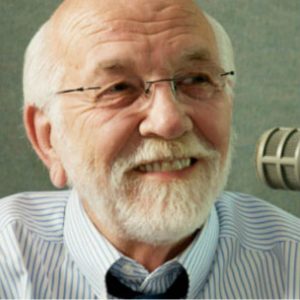
Steve Brown
Several weeks ago I sat down with noted authors and teachers Dr. Steve Brown, the founder and president of Key Life Network and Dr. Bryan Chapell, the senior pastor of Grace Presbyterian Church of Peoria, Illinois, to discuss their reading habits.
To be honest, I did not sit down with them. I emailed them. But I like to picture myself sitting with these two men, whose ministries have been so helpful to me, discussing, among other things, the books we enjoy.
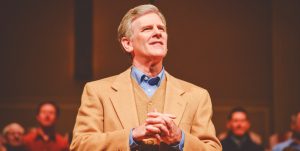
Bryan Chapell
Both men have lengthy careers in ministry and both have well-deserved reputations as being superb preachers. And both have written extensively. I direct you to their Amazon.com author pages (here and here) to sample their works. Personally, I’ve been helped by Steve’s A Scandalous Freedom and by Bryan’s Christ-Centered Preaching and Christ-Centered Worship.
Though I reproduce their answers to my questions with complete accuracy, I may have elaborated the dialog a bit. May have.
❦
Randy (RG): Steve and Bryan, I’m thankful that you have both taken time from your busy schedules to meet with me this morning.
Bryan Chapell (BC): Happy to do so.
Steve Brown (SB): Same here. Mind if I smoke my pipe?
RG: No problem. As you know, we’ve been discussing the kinds of things people read when they simply chose to read for fun and enjoyment. So, in the past year, approximately how many books did each of you read for ‘enjoyment’ (that is, books outside your direct professional interest)?
SB: Forty to fifty, maybe more.
BC: Wow! That’s impressive, Steve. For me it would have been somewhere between twelve and fifteen.
RG: I find it all impressive. What motivates you to read books outside your profession?
BC: For me, really, it is something of a hobby. It enables me to pursue other interests, and honestly, I do it for the pure enjoyment of it.
SB: Similarly, for me, it is both escape and curiosity.
RG: How do you choose what books you will read?
SB: Mostly from friends… or authors with whom I’m familiar or friends who have written books. I also review and read books when someone wants me to write a blurb.
BC: I, too, depend upon the recommendation of friends, as well as book reviews, recommendations in magazine articles, or awareness of particular author emphasis.
RG: It seems that books reach readers like churches reach visitors: mostly through networks of friends. So what book or books are you reading right now?
BC: Those that I’m reading currently are all related to my role as a pastor.
Reformed Catholicity – Michael Allen and Scott Swain
No God but One – Nabeel Qureshi
Serving a Movement – Timothy Keller
The Day the Revolution Began – N. T. Wright
The Family Life of a Christian Leader – Ajith Fernando
RG: What about you, Steve?
SB: Currently I’m reading
The Fellowship: The Literary Life of the Inklings – Philip and Carol Zaleski
Father Brown Stories – G. K. Chesterton
Takedown (5th in The Scot Harvath Series) – Brad Thor
Truth Overruled: The Future of Marriage and Religion – Ryan T. Anderson
RG: The books that stick with us and are meaningful to us are the ones we will often recommend to others. What books do you find you most often recommend to others?
SB:
Anything by C. S. Lewis
Orthodoxy – G. K. Chesterton
BC:
The Discipline of Grace – Jerry Bridges
King’s Cross – Timothy Keller
Mere Christianity – C. S. Lewis
Sacred Marriage – Gary Thomas
RG: Thanks to both of you. This has all been very helpful.
BC: You’re welcome, Randy.
SB: Glad to do it.


 That friendship led to the formation of a book discussion group formed, Jim, my Muslim neighbor, a retired professor from Cornell’s college of architecture, and me. It was short-lived (we only got through two books) because of time, not interest. But through this I learned that Jim was a reader.
That friendship led to the formation of a book discussion group formed, Jim, my Muslim neighbor, a retired professor from Cornell’s college of architecture, and me. It was short-lived (we only got through two books) because of time, not interest. But through this I learned that Jim was a reader.
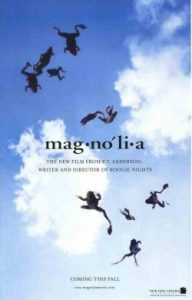 Issues that matter seem to be landing as profusely and as suddenly as the frogs in Paul Thomas Anderson’s remarkable film
Issues that matter seem to be landing as profusely and as suddenly as the frogs in Paul Thomas Anderson’s remarkable film 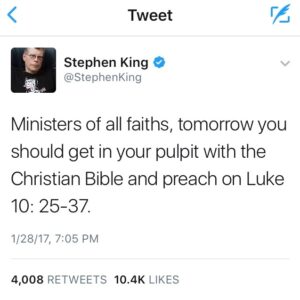
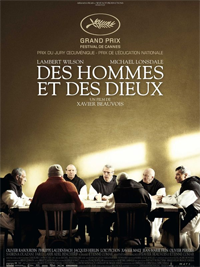 Film can be used as a tool of propaganda, as can any media, but as art it can illuminate. It can help us see what we would not otherwise see and sense what we might never otherwise experience. It can in a powerful way put our feet firmly in another’s shoes and help us see life through their eyes.
Film can be used as a tool of propaganda, as can any media, but as art it can illuminate. It can help us see what we would not otherwise see and sense what we might never otherwise experience. It can in a powerful way put our feet firmly in another’s shoes and help us see life through their eyes.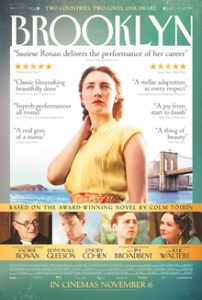 Film is never objective and neither are the suggestions below. Good movies can, without undo pontification, inform our empathic impulses in helpful and profound ways. These are movies that succeed in that. These are good movies touching upon current themes and encouraging sympathy and openness.
Film is never objective and neither are the suggestions below. Good movies can, without undo pontification, inform our empathic impulses in helpful and profound ways. These are movies that succeed in that. These are good movies touching upon current themes and encouraging sympathy and openness.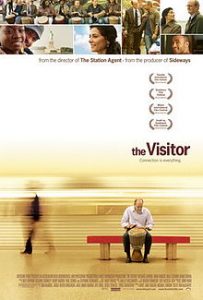 The Good Lie
The Good Lie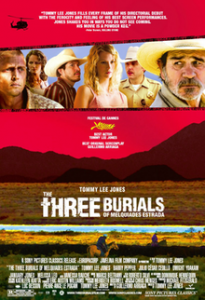 The Three Burials of Melquiades Estrada
The Three Burials of Melquiades Estrada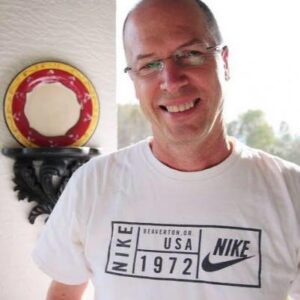 The answers to my survey questions below come from a good friend of mine, the Reverend Mike Osborne, associate pastor of
The answers to my survey questions below come from a good friend of mine, the Reverend Mike Osborne, associate pastor of